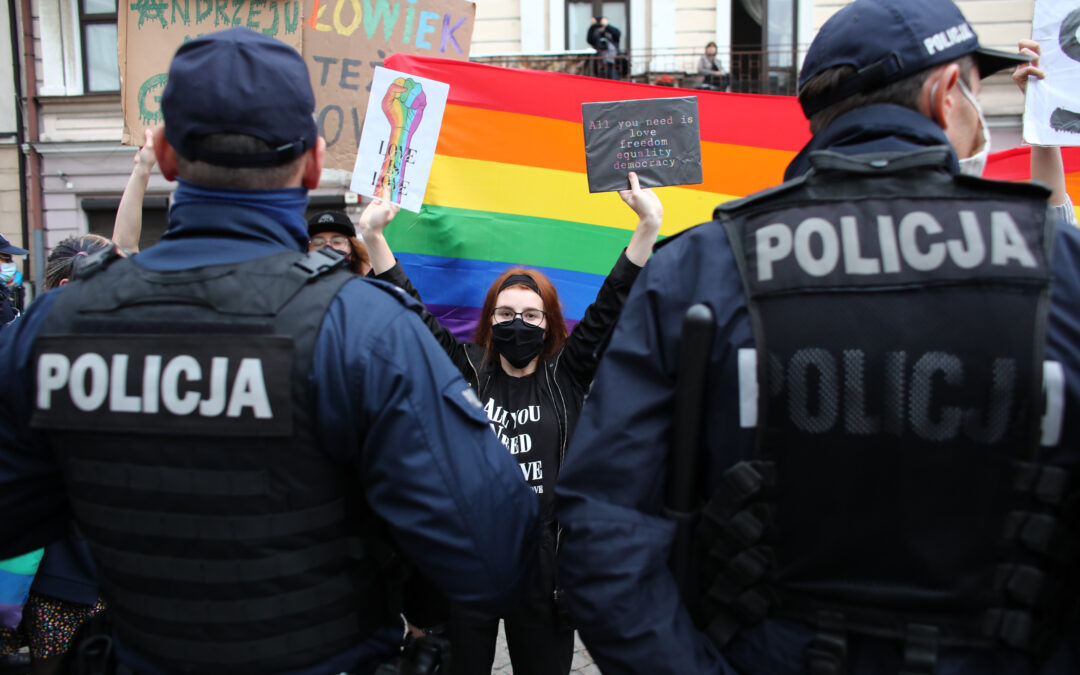A local authority in Poland has launched a legal action to make itself “free from LGBT ideology” again, after a resolution to that effect was invalided earlier this year by a court, which found the measure to be discriminatory.
“We do not want a minority telling us how to live,” says the head of the local administration, who hails from Poland’s ruling Law and Justice (PiS) party. However, he also argues that the resolution does not discriminate against anyone.
Tarnów county, a district in southern Poland with a population of almost 200,000, was among dozens of local authorities that adopted anti-LGBT resolutions in 2019 amid a campaign by the national-conservative PiS and parts of the Catholic church against what they call “LGBT ideology”.
A handful of those resolutions have since been withdrawn due to the threat of losing European funds. Others have been invalidated by court rulings made in response to cases brought by Poland’s former commission for human rights, Adam Bodnar.
In the latest such instance, Tarnów county saw its resolution invalidated in January this year, when the provincial administrative court in Kraków accepted Bodnar’s argument that it discriminated against non-heteronormative people and exceeded the powers vested in the local authorities.
Last week, Tarnów county council responded by voting to lodge an appeal to the Supreme Administrative Court (NSA) against January’s court ruling. PiS councillors, who make up a majority of 18 on the 32-seat council, were in favour while 11 opposition members were against.
“We did not stigmatise anyone with this resolution,” the county’s head, Roman Łucarz of PiS, told RDN after the vote. “We defended what was most important to us and we did not want 2% of society to impose on us what to do and what to think…We do not want the minority to tell us how to live.”
The resolution, which was adopted in April 2019, declared “Tarnów county free from LGBT ideology” and pledged to oppose “homopropaganda” and the “sexualisation of children”.
Łucarz added that he was “very disappointed with the attitude” of the opposition councillors. “I had thought that we all profess Christian values and stand firmly for faith and tradition…but unfortunately councillors from opposition groups were against” the appeal, he said.
The council’s decision was met with disappointment from Tęczowy Tarnów (Rainbow Tarnów), an LGBT rights group. Even if they are a minority, LGBT people “have the right to equal treatment in public life”, the organisation’s deputy president, Michał Babral, told Gazeta Wyborcza.
The municipal authorities in Tarnów itself – a city of 100,000 that is not part of the surrounding county – have been supportive of the LGBT community.
Last year, the city joined a nationwide campaign called LGBT+ja (LGBT+me) to promote tolerance. The city’s mayor, along with his counterparts in nearby Kraków and Oświęcim, appealed to the province of Małopolska, in which their cities are located, to withdraw its own anti-LGBT resolution.
Such actions reflect the fact that larger towns and cities in Poland tend to be more liberal, with local authorities from centrist and left-wing opposition parties. Smaller towns and rural areas are more conservative and more likely to vote for PiS.
Amid a series of election campaigns in 2018-20, PiS made opposition to “LGBT ideology” a central feature of its platform. That rhetoric was echoed by some figures in the Catholic church, with the archbishop of Kraków declaring that the “rainbow plague” is similarly dangerous to Nazism and communism.
As a result, Poland has been ranked as the worst country in the EU for LGBT people by ILGA-Europe, a Brussels-based NGO, for the last two years running.
Main image credit: Jakub Wlodek / Agencja Wyborcza.pl

Daniel Tilles is editor-in-chief of Notes from Poland. He has written on Polish affairs for a wide range of publications, including Foreign Policy, POLITICO Europe, EUobserver and Dziennik Gazeta Prawna.




















